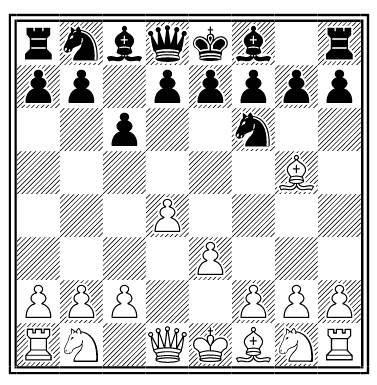The shortest decisive tournament chess game ever played was Dordevic-Kovacevic, Bela Crkva 1984:
1. d4 Nf6 2. Bg5 c6 3. e3

3. … Qa5+ wins the bishop. Dordevic resigned.
The shortest decisive tournament chess game ever played was Dordevic-Kovacevic, Bela Crkva 1984:
1. d4 Nf6 2. Bg5 c6 3. e3

3. … Qa5+ wins the bishop. Dordevic resigned.
In 1963, an Indiana construction engineer discovered a small hoard of coins on the bank of the Ohio River. Two of them eventually passed to a Clarksville museum, which identified them as Roman coins from the third century.
No one has explained how they came to be there. The engineer who found them said they’d been grouped as though in a leather pouch which had since disintegrated. But his name, and the rest of the hoard, has been lost.
Modern atheists:
“Atheism,” said George Carlin, “is a non-prophet organization.”
A man deposited $50 in a savings account, then withdrew it in various sums. When he’d recovered his $50 he was surprised to find $1 left in the account, though it had drawn no interest. When he inquired, the bank produced this ledger:

“I’d rather be a failure at something I enjoy than be a success at something I hate.” — George Burns
Anagrams:
THE NUDIST COLONY = NO UNTIDY CLOTHES
A SENTENCE OF DEATH = FACES ONE AT THE END
AN AISLE = IS A LANE
IS PITY LOVE? = POSITIVELY
CIRCUMSTANTIAL EVIDENCE = CAN RUIN A SELECTED VICTIM
CABARET = A BAR, ETC.
THE ENCYCLOPAEDIA BRITANNICA = A DICTIONARY CAN BE ELEPHANTIC
GREYHOUND = HEY, DOG, RUN!
H.M.S. PINAFORE = NAME FOR SHIP
COMMITTEES = COST ME TIME
HEARTHSTONES = HEAT’S THRONES
THE DAWNING = NIGHT WANED
A STRIP-TEASER = ATTIRE SPARSE

The Isle of Dogs. An 18th-century engraving.
A Queens College teacher left a note on his classroom door:
PROFESSOR TOBIN WILL NOT MEET HIS CLASSES TODAY.
He later noticed that a student had erased the first letter in CLASSES.
So he erased the second letter as well.
In May 1797, William Maddison, of Sunderland, very much intoxicated, being warned by the bye-standers not to leap off the Quay into a Keel, which he was meditating; he replied with a volley of oaths, that he would go to hell in a flying leap: he instantly jumped off, and his breast having struck against the gunnel, caused his instant death.
— Kirby’s Wonderful and Scientific Museum, 1803